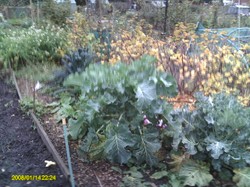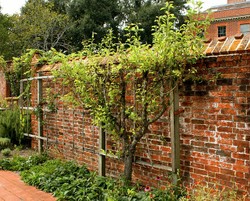The garden never stands still, it must always be in a process of change and development. Indeed with climate change the idea that anyone''s garden will remain unchanged is not sustainable. Winter is a time when some important work can be done. Certainly, planning is an important part of garden work. What do you want to do next year, what changes do you wish to make? There is necessary maintenance to be performed and waste to be disposed of. While not as busy as summer, Winter is truly a time for garden lovers to work hard to prepare for the coming year.
Planning for Next Year
A period of thinking and planning can be imposed on us, and it is no bad thing. It happened this weekend when I made the mistake of going to do some garden work after a double immunization for flu and pneumonia, routinely given to people over sixty five.But I am allergic to nothing, so there was nothing to worry about, or so I thought. After a couple of hours of enjoyable work I began to feel ill, my right arm was in serious pain and was losing flexibility. I returned home and spent the next fourteen hours in bed, some of the time shivering with fever. Doctor's verdict: bad reaction to the injections, which will go away, but in the meantime I need to rest for a few days, and anyway, after three days I have still not fully recovered use of my right arm, but I cannot stop reflecting, and so I decided to use the time to put some thought into the coming year. So here is what I am thinking.
A complete redesign of the front half of the plot is in order. A new and wider range of crops is needed. I am taking up one of the paths and creating a larger bed out of two rectangular ones. This bed will be subdivided not with paths, but with movable boards, and I hope that a walk in wonderwall, a very stable netting cloche will be purchased. This is not a permanent structure so I do not need permission, but I will need Andrew my eldest son to help me erect it, a process that should take about three hours. Hopefully it will not be a windy day, but this is North West England,so don't count on windless days. Andrew is also going to help me erect another temporary greenhouse near the picnic table.
A rethink of crops is due. I have had a massive oversupply of apples, but England's apple harvest has been excellent this year, and I have surplus to give away, so no fruit plantings are needed. I have also done well with potatoes, maybe a few too many, though I have several people to give them to. I will need more onions, especially as this year has not been onion friendly, because of a cool spring and low light levels. More carrots are on the list. But Constancia, Andrew's Angolan-Portugese wife is hoping to plant some Portugese vegetables, maybe ocra and sweet potatoes. I must admit that I have been wary of planting sweet potatoes in my area, as I have thought that we were too far north for them, but with protected cultivation I will give the planting a try. Maybe some aubergines in the new greenhouse will be another option.
Constancia has already told me that she wants to develop the flower bed, it could do with a woman's touch, as my aesthetic skills are not the best, and I am thinking of a couple of ornamental archways on the paths, lined with climbing roses.
The Greenhouse
Getting the greenhouse clear is a an important winter job. Recently Constancia spotted some mice in there, I don't mind the field mice having a little nibble of the low hanging tomatoes, but there can be other pests. Slugs can hide and even lay their eggs. It is not widely known that the large slugs are not the gardeners' enemies, for they only eat compost. It is the little chaps that cause the plant damage. So what is needed is a clear out of as much as possible. The first frosts are due soon and when that happens the tomatoes die overnight. They are currently finished fruiting and so they can be pulled up when in the next few days. But when I do this it is insufficient to leave the used compost in the pots. The compost is partly spent and could be hiding overwintering pests, so the pots will be taken out and emptied. Then they will be checked for pests and scrubbed out. Only one pot will remain, the grape vine, but that needs different treatment.
The next cleaning stage will be the ground. Any weeds that have broken through will be dealt with. Nooks and crannies are to be scoured for pests.Spiders will be welcome, as they eat troublesome insects. But the windows will need to be washed with detergent, both inside and outside.
The grape needs attention. I have fed it well with liquid seaweed and it has flourished into a long trailing vine that needs controlling. I will not need to water it for long, as it goes dormant in winter, but it will need staking. You have seen grapes trailing over Mediterranean roofs, well that's what I want to happen. But my greenhouse does not contain much potential for fixing things to the roof, so what I am planning is a bamboo frame along which the grape can trail. I am going to do a bit of research on pruning grapes over winter.
Soil
I am going to have some soil preparation done over winter. This will entail adding quite a bit of compost. I have two compost heaps, one of which may well be ready to excavate and I will spread this on the plot. The other will wait over winter, as it is the younger of the two and is not ready yet. But one technique to be used in winter is a compost trench. This is when you dig a trench in a bed and slowly fill it with compost, which rots in the ground over winter. At first it sucks some nitrogen from the soil, but when the bacteria in the trench die the nitrogen is returned.
But I am also adding manure. What I like is pelleted chicken manure, which I add to compost to make quite a powerful feed. Some beds will take much feeding. I have had good pumpkins,but they exhaust the ground and so much manure is appropriate.
Sadly, this year I am going to have to limit my addition of leaves,as they have to be delivered in the car park space, but as we are having major repairs to the internal road over the next few weeks deliveries will be disrupted. This will not prevent me from obtaining some leaves, but there will not be as many as there were previously. But I might put down another helping of rockdust, ground Scottish granite that so benefits the soil, and I never miss out on seaweed in its various forms.
But clearing debris on the ground is important, as pests can overwinter in it, so shifting the sides of raised beds to see what is underneath is a useful task, and digging over beds to expose slugs eggs to predatory birds is important. I will have to dig around the plum tree to ensure that any sawfly larvae do not find a haven in the ground,for digging destroys their cells and exposes them to birds, which welcome the addition to their diet. But one raised bed must remain in place, for there is an ants' nest under one end, and I do not want to destroy the ants' home, for they are not my enemies and do the allotment no harm.
I have some decaying wood to be burnt or tipped. This is wood that I have used for raised beds and is now decaying. The tip is not far away, and I have some space for a fire.
Gardening in winter
 |
| Winter Gardening in the Maritime Nort... |
Paths and Pruning
I have begun to renew my paths with woodchip, courtesy of the council which dumps its chipping on allotment sites for our use. I must admit that I am blessed with Trafford Council, which is friendly to allotment sites. I have to maintain one of the paths besides my plot, the one on the left looking down to the back. That was half woodchipped when the illness struck, but it will be completed soon. But I have a bit of a problem with the other, right hand path. My apple is overhanging and impeding the path. I don't want to prune it too early, but I need to keep the path clear. I think that a quick snip, a minimum prune protected by a wound healing treatment will be in order. That will need doing soon.
But the fruit tree pruning is due in January. I am fortunate that Andrew is an expert fruit nursery technician trained in pruning and has promised to do this job for me.
What the new gardening season brings I know not. We got best improved plot in Trafford this year, but the allotment committee has changed. I am still vice chair, but while I want an award next year I am unsure. However, as I have just become chair of Trafford Allotment Federation, the umbrella body for all allotments in Trafford, I hope that I can exert a positive influence across the Trafford community.
You might also like
Growing in confined spacesAs the world urbanizes and land pressures grow, many people are turning to im...
Forest GardeningThe quintessential English garden is based on a lawn, but this is not a natur...










 Darkness over the Earth the skies darkened when Jesus was crucified15 days ago
Darkness over the Earth the skies darkened when Jesus was crucified15 days ago
 TheThousand Year Gardenon 11/26/2025
TheThousand Year Gardenon 11/26/2025
 Women of the Gospelson 10/11/2025
Women of the Gospelson 10/11/2025
 Religious Gardenson 08/25/2025
Religious Gardenson 08/25/2025



Comments
You would need to perform a continent scale research project. With so much research to do which scientist would have the time?
Thank you for your comment below in answer to my previous observation and question.
Kew Gardens' afternoon tea and coffee breaks cause me to consider those drinks regarding continental European preferences.
My tendency is toward France, Greece, Italy, Portugal and Spain as coffee-drinking even as elsewhere is unclear.
Might information be accessible as to whether or not continental Europeans opt for both or coffee over tea or tea over coffee?
Coffee is very popular, especially as non British visitors tend to drink it
Your comment below on Nov. 28, 2023, in answer to my previous, same-day question advises that "My children are not great tea drinkers, they prefer coffee, but I am a devotee of tea."
A recent continuing education unit dealt with Kew Gardens. The Kew Gardens site is informative and interesting, even including an Eating & drinking section regarding their eateries.
Orangery has on its menu coffees even as Victoria Plaza Café has them too, with the special invitation of "Perfect for a coffee break throughout the day."
The Botanical Brasserie invites gardens visitors to "Afternoon tea: 3pm to 5.15pm (6.15pm on weekends and bank holidays)."
The site lists, without elaborating, other eating options on Kew Gardens grounds. Perhaps those others make available coffee only, coffee and tea, tea only. If not, coffee outnumbers tea 2 to 1!
That must be because of Unitedstatesian tourists and visitors, correct?
This question relates because it revives my question about what Frank and Maureen and their children and Veronica and her husband and their children sip upon during fruit and vegetable meals of apples, grapes and pears and of beans, leeks, onions, peas and potatoes.
What would be the drinks of your grandchildren?
Thank you!
Veronica, I love the name camp coffee and its chicory base! It preserves the rustic beauty of blue-flowering chicory among the north meadow's wild-growing flowers and onions.
(Please make sure that you always have access to non-chicory, non-coffee alternatives since I'd rather not hear about any collapsing ;-D!)
I drink coffee,but less than tea.
No. It is not part of our diet. We have nothing against it,but we do not use it
My maternal Grandma and my dad always drank Camp coffee which was chicory based . They loved it.
I am a total coffee hater in any shape or form. Instant, decaff, fresh ground. If I were desperate for liquids I would rather collapse than have coffee. I can' t think when I last had one :)
The English line of my paternal ancestors opened up my state to 19th-century settlement, not just by English immigrants. They opted for hot chicory before, during, after tea cultivation. My paternal grandmother always preserved ancestral memories, with a really tasty homemade recipe, by monthly chicory and coffee.
Would you and your wife and your children ever consume chicory?